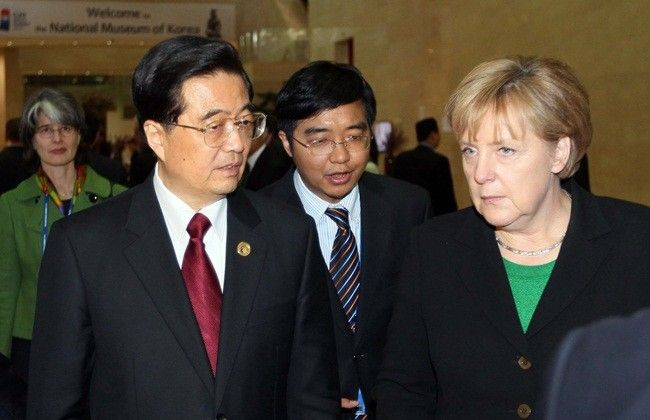G20 declares currency war over but challenges remain

The leaders of the G20 countries completed their summit in Seoul, South Korea with an agreement to push for “market-determined” currency exchange rates, to enhance exchange rate flexibility, and to establish a timetable to lay out “indicative guidelines” for global economies to confront trade imbalances by the first half of next year.
During the talks at the summit, which were quite contentious, G-20 members had sought to try limiting current account surpluses or deficits in order to establish balanced economic growth. However, differences between certain nations were too great to produce a specific pact now on how to minimize imbalances, and so the G20 members settled for a timetable.
Concrete guidelines will be made by the first half of next year and evaluated, said summit host Lee Myung-bak, president of South Korea.
The joint communiqué specifically stated: These indicative guidelines composed of a range of indicators would serve as a mechanism to facilitate timely identification of large imbalances that require preventive and corrective actions to be taken.
The G-20 leaders expect to finalize the issue by the time next year’s G-20 summit in France takes place.The group also agreed to refrain from competitive currency devaluation measures.
Also, with respect to the reform of the International Monetary Fund (IMF) and the formation, the G20 members agreed to introduce a synchronized approval system for a financial credit line for “multiple countries” through which a number of countries impacted by a common shock can simultaneously get access to loans.
The IMF will also be reformed in order to give emerging markets countries, especially China and India, a greater voice in global financial matters.
In comments after the issuance of the voluminous G20 communiqué, President Lee said it is a big change in that the IMF is expanding its role to crisis prevention as well as crisis resolution
Overall, Lee described the progress made by the member countries during the course of the summit as “remarkable.”
Lee also declared that the so-called “currency war” has ceased, at least temporarily.
For now, in conclusion, (the world) is out of the so-called currency war, Lee said in a press conference.
After Lee’s comments, U.S. President Barack Obama described the summit pact as a broad agreement on the way forward” and that he was very pleased by the accomplishments.
However, he added that great challenges remain and that G20 nations “must finish the job.”
In response to a question from the gathered press, Obama said that China’s currency is undervalued and that the Chinese need to make a transition to market-based system.
Obama also noted that the subject of China’s undervalued yuan is an “irritant” not only to the U.S., but also to many of China's other trading partners.
Also, as summit host, President Lee said he discussed a new strategy for the economic development of the world’s poorer nations, noting that while G20 members account for 85 percent of global GDP, the group has no representation for more than 170 countries, most of which are developing.
Lee cited South Korea's own miraculous progress as an aid recipient to aid donor in his lifetime as a “role model” for other countries to follow.
South Korea plans to propose the 'South Korean-style development model,' based on success and failure of South Korea's development policy, through an appropriate opportunity, including the Organization for Economic Cooperation and Development (OECD) Development Aid Committee meeting, he said.
Lee concluded that the agreements arrived at by the G20 leaders, should they be implemented as agreed, “will contribute greatly to preventing a future global economic crisis. We all have to cooperate for this,”
Citing a survey by the IMF, Lee said that the agreements reached today at the G20 summit would help to create 25-million new jobs worldwide and add $1-trillion to global GDP by 2014.
© Copyright IBTimes 2024. All rights reserved.





















